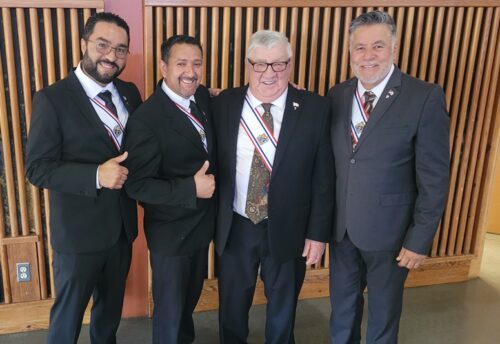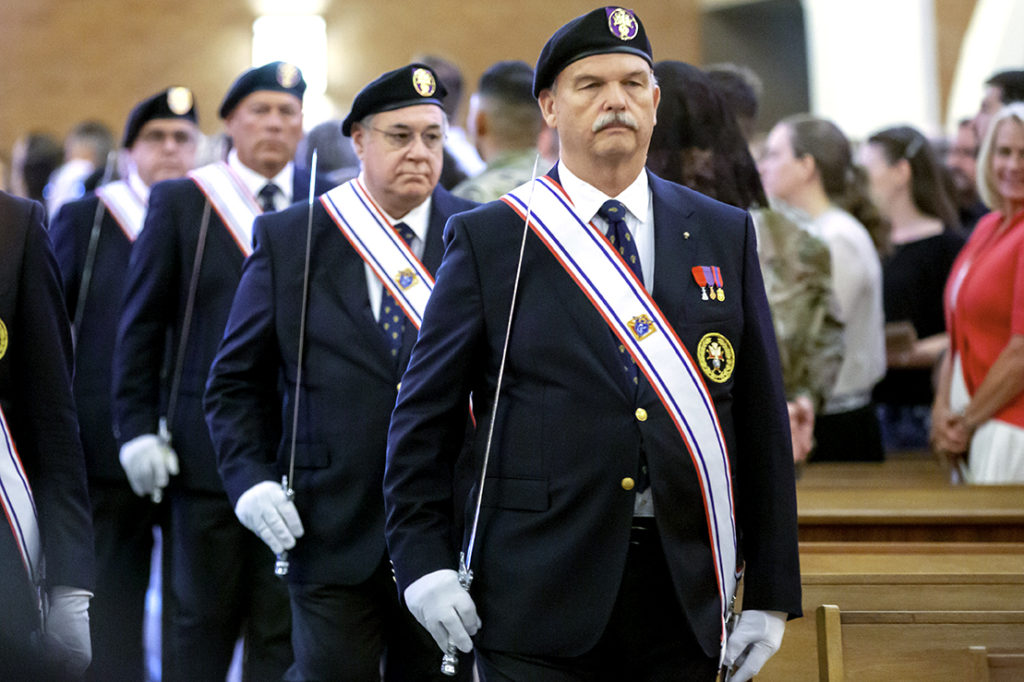Structure of the Patriotic Degree
 The controlling authority of the Patriotic Degree is the Order’s Board of Directors. The board:
The controlling authority of the Patriotic Degree is the Order’s Board of Directors. The board:
- Appoints the Supreme Master and the Vice Supreme Masters
- Creates new provinces, districts and assemblies
- Makes, amends and changes all laws, rules and regulations of the Patriotic Degree
The Supreme Master holds administrative authority in the Patriotic Degree and supervises all of its officers and assemblies. He appoints Vice Supreme Masters and District Masters and makes detailed reports and recommendations to the board of directors.
The Supreme Assembly consists of the Supreme Knight, Supreme Secretary, Supreme Master, and Vice Supreme Masters of the Patriotic Degree. The Supreme Assembly meets annually to consider all matters relating to the welfare of the Patriotic Degree and recommends to the board of directors amendments to the Laws and Rules Governing the Fourth Degree (#1350).
Provinces
A Patriotic Degree province exists under the authority of a Vice Supreme Master and consists of a number of Patriotic Degree districts. The Provincial Assembly consists of the Vice Supreme Master and all District Masters in the province. It meets whenever the Supreme Master and the board of directors deems it advisable.
Districts
The Patriotic Degree district comprises a number of local assemblies in a given area and falls under the authority of the district master. The district assembly is composed of the faithful navigator of each assembly and one delegate for each 100 members or major fraction thereof. It meets every two years in the even numbered years in March or April to consider Patriotic Degree matters. It also selects three members to be recommended to the supreme master for his consideration in appointing a district master.
Local Assemblies
Local assemblies serve one or more local councils and are structured like local councils, although different names are used for officers. The administrative authority of the local assembly falls to the faithful navigator.

Color Corps
The local assembly’s color corps is led by the color corps commander who is appointed by the faithful navigator. The color corps provides the honor guard for assembly functions as well as for local council functions, and may provide color guards for the ceremonies with the colors (flags). Refer to the Fourth Degree Color Corp Drill Manual (#808) for details on the color corps and uniform. The color corps rank and office are symbolized by the color appearing behind the Fourth Degree Medal Badge affixed to the Official Color Corps beret and colored service baldric. The color corps member wears a beret with no flash behind the Fourth Degree Medal Badge. The corps commander wears a purple cloth flash behind the badge and a purple service baldric. The faithful navigator can be identified by a white flash and a white service baldric. The district marshal — the leader of the district color corps or combinations of local assemblies wears a green flash and a green service baldric. The district master wears a gold flash and service baldric, while the vice supreme master wears a light blue flash and service baldric. The supreme master wears a dark blue flash behind the Fourth Degree Medal Badge affixed to the black beret and dark blue service baldric. (Note: Only supreme masters, vice supreme masters, district masters and faithful navigators are entitled to wear the color of their position after they leave office.)
Relationship to the Membership Degree
The Patriotic Degree exists as a separate entity focusing on patriotism, but it is part of — not apart from — the Degree. All assembly members must be members in good standing of the Membership Degree. (Suspension or withdrawal from the Membership Degree automatically terminates membership in the Patriotic Degree.)
The State Deputy is the chief executive officer in his jurisdiction. Although the State Deputy does not exercise administrative authority in the Patriotic Degree, he should be concerned about the welfare of the Patriotic Degree because its members are members of the Order under his jurisdiction. The State Deputy:
- May make recommendations to the supreme master regarding the appointment of vice supreme masters and district masters in his jurisdiction, as well as the creation of any new districts
- Clears all dates for Patriotic Degree exemplifications set by the vice supreme master or masters in his jurisdiction to avoid conflict with state council programs (e.g. Installation of state officers, state convention, July and December district deputy meetings)
- Is kept informed by the supreme master of all programs of the Patriotic Degree in his jurisdiction and should support these programs
- Should allow space in his jurisdiction’s news bulletin for Patriotic Degree news and encourage local councils to do likewise
- Includes a list of assemblies and officers in his state directory
- Recognizes Vice Supreme Masters and District Masters attending state council meetings and functions as State Deputies and State Officers should be recognized at Patriotic Degree functions
- Sees that district deputies have sufficient knowledge of the Patriotic Degree to be able to report Patriotic Degree matters to his councils
The Patriotic Degree contributes to the stability of the Membership Degree because the suspension rate is less than one percent. Additionally, the Patriotic Degree is the visible arm of the Knights of Columbus. The regalia and the presence of the color corps in churches and at other functions often lead potential members to consider joining the Order.
Patriotic Degree Programs
Assemblies should not participate in or sponsor programs in competition or conflict with councils. Patriotic degree programs include:
- The “Serving Those Who Served” Veterans Affairs Voluntary Service (VAVS) program
- Military Chaplains Scholarship Program
- Wakes and honor guards for Knights and veterans
- Flag Day June 14-Knights of Columbus “One Nation Under God” program
- Memorial Day cemetery services
- Assembly civic programs
- Culture of life efforts
- Parades and civic ceremonies
- Voter registration and “Get Out the Vote” campaigns
- Immigration, naturalization and citizenship programs
- Essay and poster contests on historical or patriotic subjects
- Flag display programs and distribution of patriotic information
Protocol
Proper protocol should be followed by all fraternal leaders. Protocol, by definition, is basic common courtesy. Protocol, Ceremonials, and Meetings (#11620) contains specific information governing many types of situations where protocol is involved. Keep in mind, however, that where there is no specific rule governing a situation, you will not go wrong by employing common courtesy.
Invitations — Guests should be sent proper invitations in writing well in advance (at least six weeks before the event). All invitations should be sent in the name of and signed by the grand knight, district deputy or state deputy, respectively. Replies may be directed to a chairman or committee member.
The invitation should let the guest know timing, agenda, dress and any special expectations.
Your district deputy, as a special representative of the supreme knight and state deputy, should be invited to all council functions. However, it is not proper protocol to send a “blanket” invitation to your district deputy with the expectation that he will attend each event. It should be understood that his schedule may not permit him to attend all affairs, in which case he would notify you in ample time.
Speakers — Speakers for an event should be notified well in advance that they are expected to speak. A courteous fraternal leader does not approach a guest just before or during a program and ask if he wants to talk. This may give the impression that you would prefer he did not speak, but if he wanted to talk, you would permit it.
Head Table — Seating is usually arranged by the highest rank from the middle out to either end. Guests are introduced from the right toward the middle then from the left toward the middle, excluding speaking members at the head table. The wives of all those seated at the head table should also be included in the dais. The following priority list should apply for speaking programs and seating arrangements: clergy, Knights of Columbus (in ranking order), civic dignitaries and other fraternities.
When more than one priest is present and a speaker does not wish to mention each by name, he should say “Rev. Monsignori” and/or “Rev. Fathers.” Never use “Reverend Clergy” unless clergymen of different faiths are represented.

 The controlling authority of the Patriotic Degree is the Order’s Board of Directors. The board:
The controlling authority of the Patriotic Degree is the Order’s Board of Directors. The board: